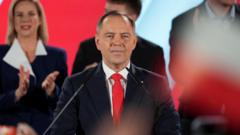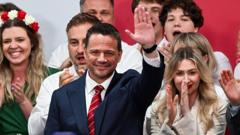In a defining runoff election set for Sunday, Polish presidential candidates Rafal Trzaskowski and Karol Nawrocki duel for control over a demographic largely leaning toward anti-establishment sentiments.
Poland's Presidential Race: Young Voters Remain Undecided Ahead of Runoff

Poland's Presidential Race: Young Voters Remain Undecided Ahead of Runoff
As a tight presidential election looms in Poland, candidates face significant challenges in appealing to disenchanted youth voters.
In Poland, a highly anticipated presidential runoff is approaching, capturing significant attention due to the pivotal role young voters will play in the outcome. The two main candidates, centrist Rafal Trzaskowski and nationalist Karol Nawrocki, represent the dominant factions of Poland's political landscape but are struggling to connect with voters aged 18 to 29, a key demographic that showed a strong preference for anti-establishment candidates in the first round of voting on May 18.
The election's stakes are high, not just for the candidates but for the future of Poland itself, a leading nation in the European Union's post-communist landscape. Current Prime Minister Donald Tusk hopes to dismantle the influence of previous populist leadership and reshape the nation's trajectory. However, with many young people feeling disillusioned by the mainstream options, the runoff takes on an unpredictable nature.
Trzaskowski, the liberal mayor of Warsaw, is backed by Tusk's Civic Platform party, while Nawrocki, a historian and former boxer, is supported by the Law and Justice party, which was in power before the current administration. Young voters have expressed dissatisfaction with both choices, leading to a potential shake-up of the electoral landscape if their preferences remain ignored.
With voter turnout and engagement crucial, this election may emerge as a turning point for Poland's political future, offering insights into the shifting attitudes and priorities of its younger generations in a widely scrutinized European electoral climate.
The election's stakes are high, not just for the candidates but for the future of Poland itself, a leading nation in the European Union's post-communist landscape. Current Prime Minister Donald Tusk hopes to dismantle the influence of previous populist leadership and reshape the nation's trajectory. However, with many young people feeling disillusioned by the mainstream options, the runoff takes on an unpredictable nature.
Trzaskowski, the liberal mayor of Warsaw, is backed by Tusk's Civic Platform party, while Nawrocki, a historian and former boxer, is supported by the Law and Justice party, which was in power before the current administration. Young voters have expressed dissatisfaction with both choices, leading to a potential shake-up of the electoral landscape if their preferences remain ignored.
With voter turnout and engagement crucial, this election may emerge as a turning point for Poland's political future, offering insights into the shifting attitudes and priorities of its younger generations in a widely scrutinized European electoral climate.





















